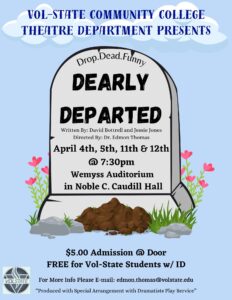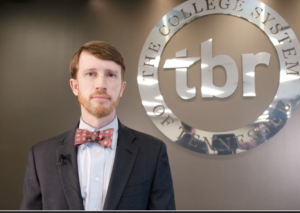Last updated on March 9, 2019
By: Riley Holcraft
Volunteer State Community College continues its Let’s Talk series with a discussion about post-traumatic stress disorder. The audience was mostly made up of students studying to become EMTs; a better understanding of this common condition is useful on the job.
Tiffany Zwart, Coordinator of Student Support, organized this event near Veteran’s Day due to the fact that PTSD targets many members of the military community.
Guest speaker, Joanna Finney Dixon, gave a presentation concerning the causes, symptoms, and treatment of PTSD. Dixon is a licensed marriage and family therapist, mother to three children, and founder of Matters of the Heart Counseling.
Dixon opened the lecture with a breathing exercise. “When you are upset, the first thing to do is breathe, whether you are experiencing triggers for PTSD or you are just stressed out like I assume many college students are,” stated Dixon.
She explained the importance of mental health because manifesting negative emotions can lead to severe anxiety, depression, and other conditions.
Certain things such as stress or social anxiety are components of PTSD that most people can relate to. It is common to pair PTSD with war-related violence, but it has many faces.
Abusive childhoods, domestic violence, experience with crime, major car wrecks, and bullying are other causes for the diagnosis. Essentially, any person can be affected by trauma and it’s important to be aware of others.
“Our bodies are the last thing to release trauma. We can have a physiological response to something and no cognitive reason or recall as to why we are feeling distressed,” explained Dixon.
This is one aspect that makes the treatment of PTSD a tricky one. Yoga, meditation, and medications are popular forms of treatment. The key to conquering PTSD is releasing all of your emotions and then storing them in a healthy and beneficial way.
Dixon also specializes in the trauma treatment, Eye Movement Desensitization, and Reprocessing. EMDR is a type of psychotherapy that enables people to heal from the symptoms and emotional distress that are the result of disturbing life experiences.
The treatment contains a preparation phase in which the patient identifies the trauma and a processing phase in which the patient learns to maintain it.
EMDR activates parts of the brain that are rarely used and retrains the participant to control stressful triggers. Dixon performed an example of the treatment with a volunteer.
She utilized a device that had two buzzers for the volunteer to hold. The buzzers would vibrate one at a time, activating both parts of the body while she soothed the volunteer with calming words and thoughts. After the exercise, the volunteer stated he felt a sense of relaxation.
She closed the seminar with a call to action. Dixon encouraged audience members to recognize triggers and always implement safety.
PTSD episodes are preventable through the monitoring of substance abuse, having a plan, and knowing safe locations. In the moment strategies include staying calm and calling for help if needed.
Post Traumatic Stress Disorder can affect many different people, and it is important to always be receptive of others.





Comments are closed.